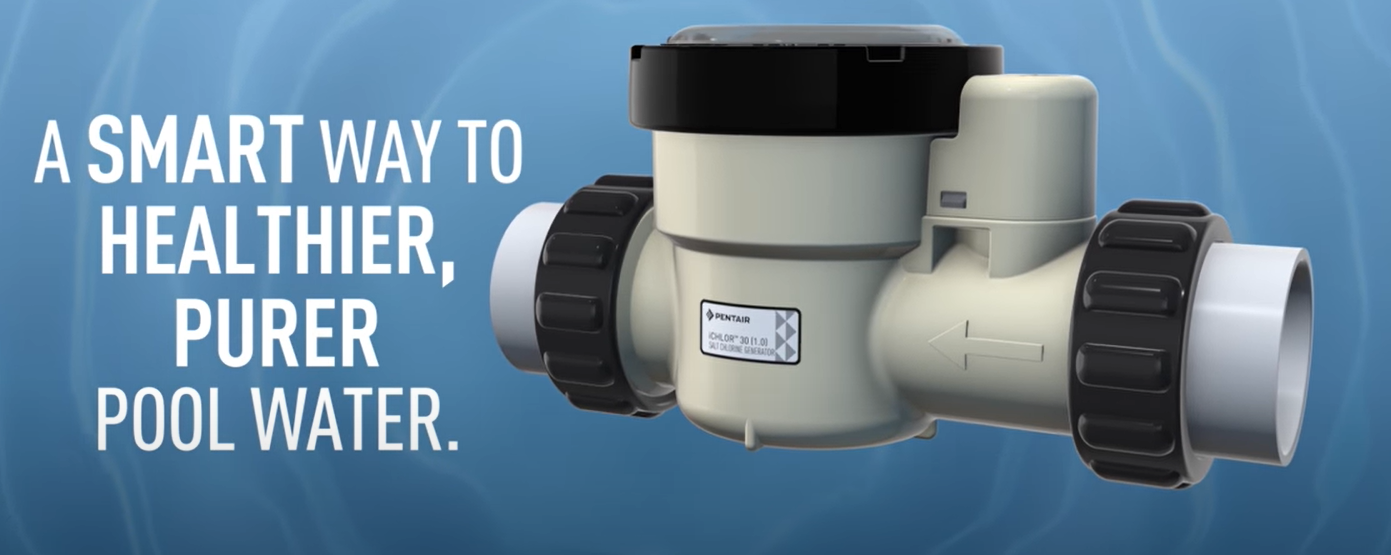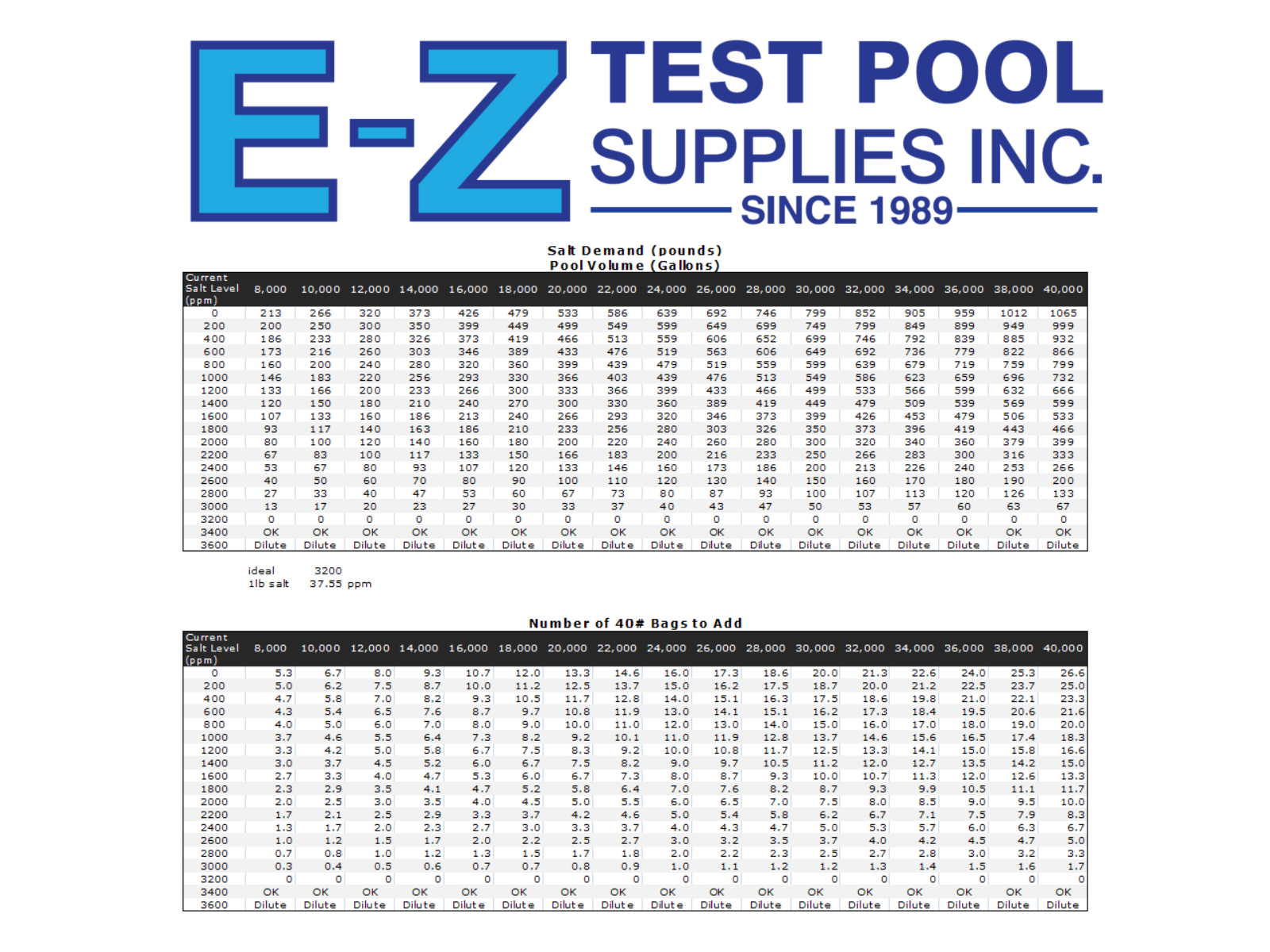Published by Matt Fichera on 06/19/2020
What is a Salt Water System for Your Swimming Pool?
You may hear some pool owners refer to their pool as having a “salt-water system”, and it would be typical for you to immediately think of the ocean and the taste of salt while at the beach.
What Exactly is a Salt Chlorine Generator?
A salt chlorine generator uses common table salt to make all of the chlorine that your swimming pool needs. It takes away the need for you to buy, store, or handle chlorine like you typically would have had to do in the past.
Electing to go with a salt water system gives you all of sanitization your pool needs and even throws in some added benefits. Many pool users report that water treated with salt actually feels softer on the skin. It doesn’t discolor bathing suits, eliminates red irritated eyes, and knocks out any strong chemical odors that may be present when using traditional chlorine. Salt treatment helps provide clean and sparkling water for everyone to enjoy.
How Does Salt Sanitize?
You add salt to your pool water, and the salt chlorine generator converts it to chlorine (hypochlorous acid). The salt is added at a level high enough to sanitize but not high enough to be considerably noticeable. It would need to be around 5,000 ppm (parts per million) to be bad, and the range for a salt chlorinator in a pool is generally 3,000-4,000 ppm.
Using a salt system will not make your swimming pool taste or smell like a visit to the beach. A pool uses salt only at 1/10th the salinity level of the ocean. Pool water treated with salt is more comparable to contact lens solution or a teardrop.
How Does a Salt System Work?
A pool sanitizing salt system works with two main components which are the cell and the control board. The pool water flows through the cell within a series of metal grids that contain a low-voltage electrical current. The presence of the current causes a reaction to occur that converts the salt to very small bubbles of pure chlorine. When the pure chlorine leaves the chlorinator, it reacts with the water to create hypochlorous acid. Producing this is your end goal and is what will keep the pool clean.
What Kind of Salt Does a Salt Chlorine Generator Use?
When choosing salt to purchase, look for its purity level. 99% purity or higher will give you the least amount of trouble in both appearance and maintenance.
How much salt does my swimming pool system need?
The ideal range is between 3,000 and 4,000 ppm. Be sure to check the rating of your cell as it could differ slightly. A rule of thumb is the following:
For a new pool: Add a 40-50 lb. bag of salt for every 2,000 gallons of water in the pool.
For other pools: Test the water first to obtain a basis and then optimize from there. Consult a pool store or a chart for this. Click the image below for our pool salt table.
(Click Image to Enlarge)
How much does a swimming pool salt chlorine generator cost?
Salt chlorine generators typically cost between $1,000–$2,000 up front and can last about 3–7 years. Your salt levels and pool water optimizing go a long way in maximizing longevity. Overall, they are easy to maintain, they keep the water clear, and cost less than traditional chlorine annually. A salt water pool typically costs $50–$100 per year to maintain. Compare this to traditional chlorine pools, which cost $250–$300 per year. Replacing the cell unit costs $700–$900 every 3–7 years.
Taking all the expenses into account, using a salt chlorine generator in your pool costs about the same as traditional chlorine over a larger amount of time. A salt chlorine generator would be more convenient throughout the same timeline.
What are the Pros and Cons of using a salt water sanitizing system for your swimming pool?
Pros:
Lower annual cost when compared to traditional chlorine.
No chlorine smell.
Clearer water that is silkier to the touch.
Gentle on the eyes and the skin.
Eliminates trips to the pool store and lugging around big buckets of chlorine.
Cons:
Can be expensive to replace parts.
It can become easier to forget about testing your water.
Utilizing a salt system is a very modern and efficient way to maintain good sanitization in your swimming pool but it can be very easy to fall into habits of not maintaining all aspects of your water’s health. The water stays clear and the chlorine levels never seem to burn your eyes or skin. This can be misleading as chlorine levels can in fact creep up without noticing or checking. Increased levels over time can damage the pool or pool components as it’s hard on the equipment. Nothing will ever beat regular maintenance.
Does a salt water pool sanitizing system work with all pool types?
A salt chlorine generator works best with fiberglass pools. It also works fine with vinyl liner pools with polymer wall panels and concrete pools with a tiled interior surface.
Don’t use salt water systems in vinyl liner pools with metal wall panels. The salt will corrode the panels as well as any handrail and ladder anchors made with galvanized steel. Salt water is abrasive on the interior surface of a concrete / gunite pool, especially plaster.
E-Z Test Pool Supplies offers many different complete salt systems, replacement cells, and parts. Visit our website at: https://www.eztestpools.com/salt-cells/ to shop. For any questions please contact us here, give any one of our retail stores a call or stop in during normal business hours.







